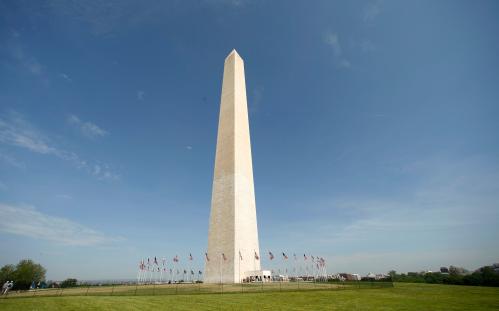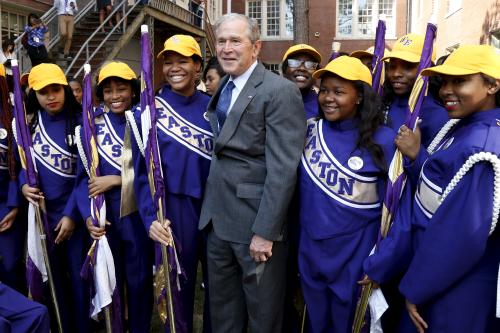Tonight, for the first time, Hillary Clinton and Donald Trump will share a stage for a presidential debate. If the debate is anything like this election more generally, we probably won’t hear much about K-12 education. While it is tempting to bemoan the silence on K-12 issues, it’s instructive to consider why they have received so little attention. Let’s look at three possible explanations, including one that probably hasn’t received the attention it deserves.
Explanation 1: This election is about issues other than education
Perhaps education is a backburner issue in 2016 because other issues have the country’s attention to a greater extent than usual. Concerns about police conduct and terrorism, for example, feature more prominently in national discussions than the Common Core and charter schools. In fact, when Gallup recently asked Americans to identify the most important problem facing the country today, only 3 percent named education. That lagged behind eleven other issues, led by the economy (in general) at 17 percent, dissatisfaction with government at 13 percent, and terrorism at 9 percent.
Still, even if this indicates that education isn’t in the forefront of Americans’ minds, is education ever in the forefront of Americans’ minds? Here, too, we can turn to Gallup, which has asked a similar question about the country’s most important problem for decades. The responses over time suggest that education’s standing among the issues of the day isn’t too far from its historical norm (with data compiled by the Comparative Agendas Project).*
 Source: Comparative Agendas Project. Gallup’s Most Important Problem [Dataset]. Retrieved from http://www.comparativeagendas.net/datasets_codebooks
Source: Comparative Agendas Project. Gallup’s Most Important Problem [Dataset]. Retrieved from http://www.comparativeagendas.net/datasets_codebooks
The reality is that education is almost always a backburner concern for Americans. Aside from a spike in concern around the time of No Child Left Behind’s passage (a spike that subsided with 9/11), education has never been seen by more than about five percent of Americans as the country’s most important problem.
There are circumstances that could temper K-12 education’s relative importance even further in this election. Higher education issues related to college tuition and debt have been discussed in some detail, especially during the Democratic primary season, which could be crowding out discussion of K-12 education. (Of note, those also happen to be pocketbook issues.) The recent passage of the Every Student Succeeds Act (ESSA) has sparked debate about whether the next president will have much influence on K-12 policy. Moreover, Trump has expressed a preference for local control and, by my count, has eight written words about K-12 education on his campaign website (“I will end common core. It’s a disaster.”).
Explanation 2: This election isn’t about issues
Maybe it’s not that the 2016 election is about other issues but rather that the 2016 election isn’t really about any issues at all. A new report from Thomas Patterson of the Shorenstein Center at the Harvard Kennedy School dissects news coverage of the recent Democratic and Republican national conventions, with a focus on what is being reported and how. Patterson describes a trend in campaign coverage from the descriptive reporting of facts to more interpretive reporting that prioritizes novel and sensational storylines. In this context, policy positions have less appeal than scandals, conflicts, and the horse race itself. The report finds, for example, that polls and projections (20%) constituted a much larger share of the media’s coverage of the conventions than policies and issues (8%). This trend was also evident during the 2016 primaries and caucuses.
Perhaps it isn’t just education policy, but rather policy more broadly, that is getting lost amid the poll-watching, name-calling, and fleeting dramas of the 2016 election. One could argue that this election has more clearly illustrated what our political process needs from public schools—a citizenry instilled with an appreciation of political civility and the responsibilities of democratic life—than what it will do for public schools.
Explanation 3: Neither candidate has served as governor
One of the subtle ways that this election is historically anomalous is that neither major party nominee has previously held office as a governor. A consequence of having no former governors is that there are no gubernatorial records to tout or criticize. Public education is a core responsibility of state governors, and an ex-governor’s record provides fodder for discussion and debate. In fact, when education has been discussed in prior elections, either on the campaign trail or in debates, the context is often not the candidates’ positions on current issues but rather their past governing records. The 2016 election is just the second election since 1972 in which that’s the case (2008 was the other). Consider the following exchange between Bob Schieffer (the debate moderator), Mitt Romney, and Barack Obama during the final presidential debate of 2012. Romney pivots away from foreign policy and towards education to boast of the performance of Massachusetts students under his watch.

That probably won’t happen tonight. With neither candidate having served in an office that produced an education governance record, there just isn’t as much for these candidates to discuss as there has been for past candidates. Even despite this, many of the references to education in this election have emphasized the candidates’ histories rather than their positions. For example, Bill Clinton’s speech at the Democratic National Convention highlighted Hillary’s experiences in desegregating schools, bringing the HIPPY preschool program to Arkansas, and chairing the Arkansas Educational Standards Committee.
In contrast to the presidential nominees, each vice presidential nominee has served as a governor. Tim Kaine was the governor of Virginia from 2006 to 2010, and Mike Pence has been the governor of Indiana since 2013. If K-12 education is seriously discussed during this debate cycle, the October 4 vice presidential debate could be the best bet for when it happens.
* Thanks to Elizabeth Martin at Brookings for help with the chart. The gap in the chart represents years for which data are not available.







Commentary
Why we probably won’t hear much about K-12 education in tonight’s debate
September 26, 2016